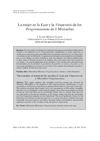Please use this identifier to cite or link to this item:
https://accedacris.ulpgc.es/jspui/handle/10553/70231
| Title: | La mujer en la Laus y la Vituperatio de los Progymnasmata de J. Micraelius | Other Titles: | The examples of women in the exercises of Laus and Vituperatio of J. Micraelius’ Progymnasmata | Authors: | Moreno García, Jesús Alexis | UNESCO Clasification: | 570201 Lingüística histórica 620202 Análisis literario 620205 Retórica |
Keywords: | Micraelius Rétorica Progymnasmata Valores y vicios femeninos Rhetorics, et al |
Issue Date: | 2019 | Journal: | Revista de estudios latinos | Abstract: | En este trabajo analizamos los ejemplos de mujeres que Johannes Micraelius ofreció a sus alumnos en los Progymnasmata Aphthoniana in usum scholarum et studiosorum eloquentiae para que elaboraran los ejercicios de la Laus y la Vituperatio, y concluimos que, en Micraelio, la presencia de la mujer en los ejemplos es abundante; que no se la relega a la esfera doméstica, pues hay ejemplos de mujeres gobernantes;
no hay vicios ni virtudes exclusivos de mujeres, sino que ambos sexos los comparten y el elogio o la censura dependen de la conducta. Las virtudes más relevantes para el humanista son la fortitudo, la prudentia, la pudicitia o castitas y la pietas, y los vicios más señalados son la impietas y la libido como apetito desordenado de poder o sexual, es decir, la falta de temperantia. This paper analyses the examples involving women put forward by Johannes Micraelius to his students in the Progymnasmata Aphthoniana in usum scholarum et studiosorum eloquentiae to prepare the exercises of Laus and Vituperatio. The analysis concludes that women have a strong presence in Micraelius’ examples; that they are not relegated to the domestic sphere, since there are examples of ruling women as well; that there are no exclusively female vices or virtues, since they are not associated to the sexual condition of the human being; and that the encomium and the vituperation depend on one’s behaviour. The most significant virtues for the humanist are fortitudo, prudentia, pudicitia or castitas and pietas, whereas the most noticeable vices are impietas and libido, the latter being considered an uncontrolled appetite for power or sex, in other words, the lack of temperantia. |
URI: | https://accedacris.ulpgc.es/handle/10553/70231 | ISSN: | 1578-7486 | Source: | Revista de estudios latinos (RELat) [ISSN 2255-5056], n. 19, p. 229-249 |
| Appears in Collections: | Artículos |
WEB OF SCIENCETM
Citations
1
checked on Feb 25, 2024
Page view(s)
58
checked on Jan 10, 2026
Download(s)
13
checked on Jan 10, 2026
Google ScholarTM
Check
Share
Export metadata
Items in accedaCRIS are protected by copyright, with all rights reserved, unless otherwise indicated.
